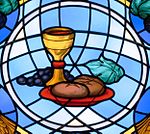
Back Podobojí Czech Kelchkommunion German Comunión bajo las dos especies Spanish Espèces eucharistiques French Perjamuan Kudus dalam dua rupa ID 양형 영성체 Korean
This article has multiple issues. Please help improve it or discuss these issues on the talk page. (Learn how and when to remove these messages)
|
| Part of a series on the |
| Eucharist |
|---|
 |

Communion under both kinds in Christianity is the reception under both "species" (i.e., both the consecrated bread and wine) of the Eucharist. Denominations of Christianity that hold to a doctrine of Communion under both kinds may believe that a Eucharist which does not include both bread and wine as elements of the religious ceremony is not valid, while others may consider the presence of both bread and wine as preferable, but not necessary, for the ceremony. In some traditions, the second element may be grape juice in place of wine containing alcohol.